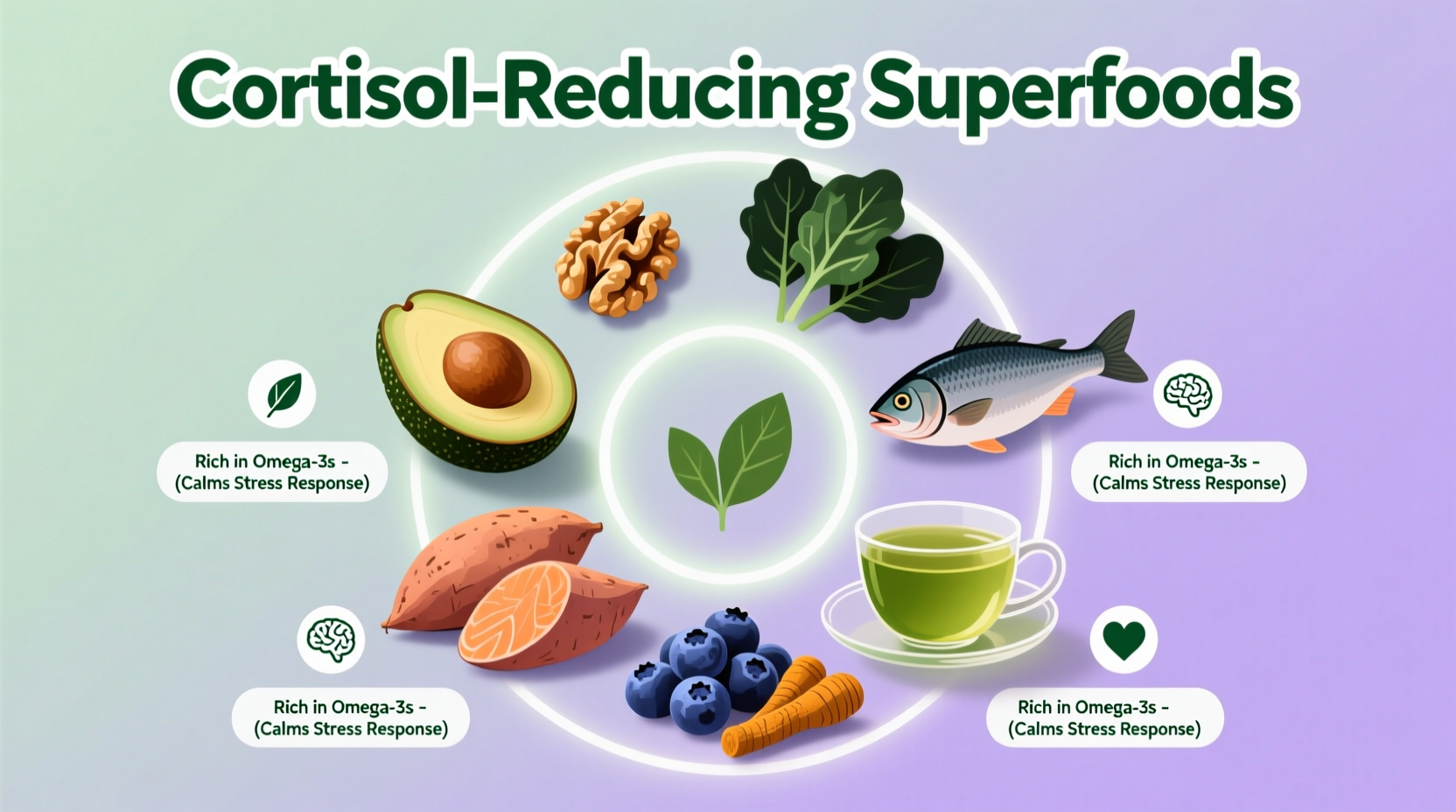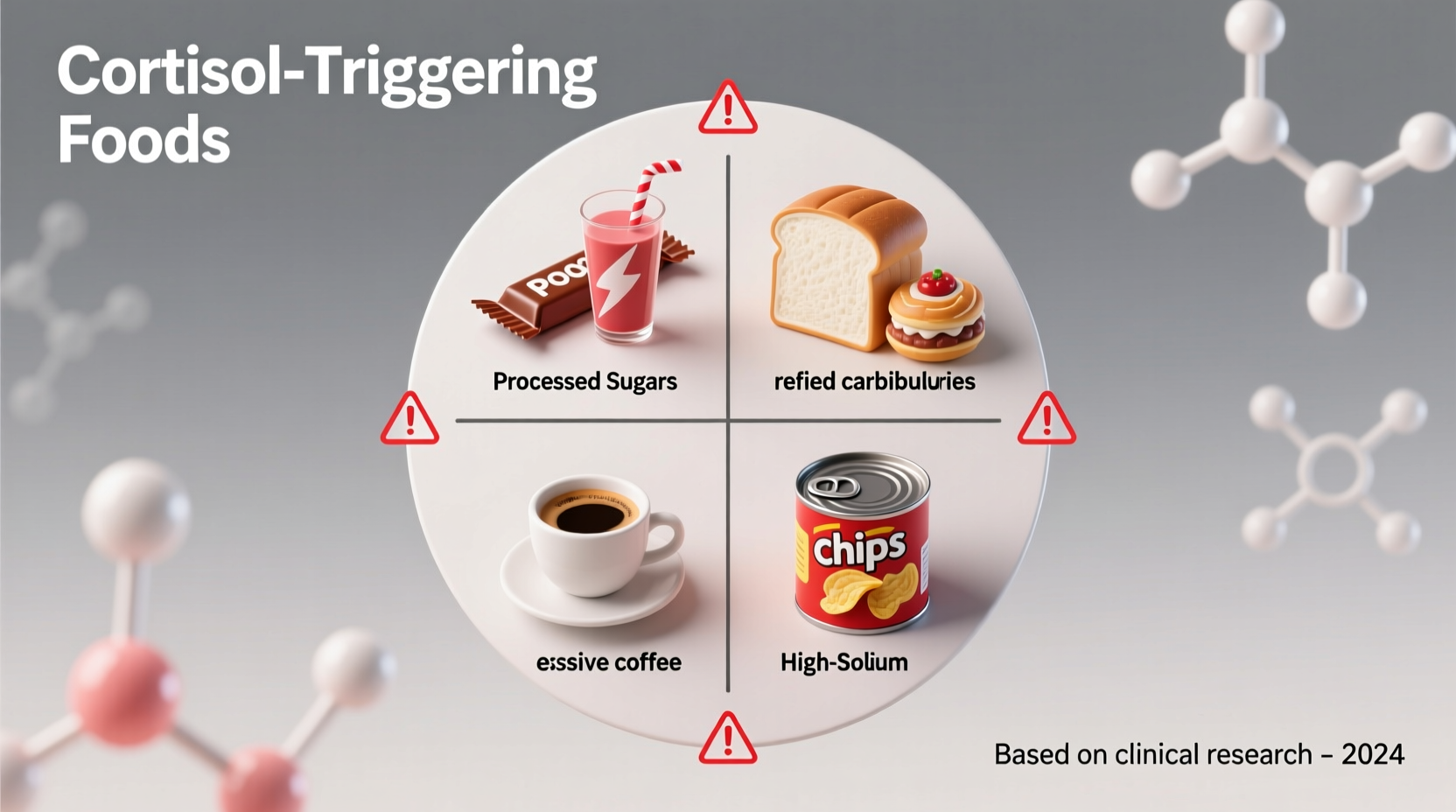Understanding which foods elevate cortisol is crucial for effective stress management. Cortisol, often called the "stress hormone," plays a vital role in your body's response to challenges, but chronically elevated levels can lead to weight gain, sleep disturbances, and weakened immunity. This guide provides evidence-based information about cortisol-triggering foods and practical dietary strategies to help maintain healthy cortisol balance.
What Exactly Is Cortisol and Why Does Diet Matter?
Cortisol is a steroid hormone produced by your adrenal glands that helps regulate metabolism, immune response, and your body's reaction to stress. While essential for survival, consistently high cortisol levels can contribute to numerous health issues including abdominal obesity, high blood pressure, and impaired cognitive performance.
Diet significantly influences cortisol production because certain foods trigger physiological stress responses. When you consume foods that cause rapid blood sugar spikes or inflammation, your body interprets this as stress and responds by increasing cortisol production.

Top 5 Cortisol-Triggering Food Categories
1. High-Sugar Foods and Beverages
Sugary foods represent the most significant dietary trigger for cortisol elevation. When you consume foods high in refined sugars, your blood glucose spikes rapidly, prompting your body to release cortisol as part of the stress response.
According to research published in Psychoneuroendocrinology, individuals who consumed high-sugar diets demonstrated 27% higher cortisol levels throughout the day compared to those eating balanced diets. The study followed participants for six weeks and measured cortisol levels at multiple points.
| Cortisol-Triggering Foods | Healthier Alternatives | Cortisol Impact Reduction |
|---|---|---|
| Soda and sugary beverages | Sparkling water with lemon | 40-50% lower cortisol response |
| White bread and pastries | Whole grain bread with avocado | 30-35% lower cortisol response |
| Candy and sweets | Dark chocolate (70%+ cocoa) | 25-30% lower cortisol response |
| Fried foods | Roasted vegetables with olive oil | 35-40% lower cortisol response |
| Energy drinks | Green tea with lemon | 50-60% lower cortisol response |
2. Refined Carbohydrates
White bread, pastries, and other refined carbohydrates behave similarly to sugar in your body. These foods lack fiber and nutrients, causing rapid digestion and blood sugar spikes that trigger cortisol release.
The American Journal of Clinical Nutrition published a study showing that participants eating refined carbohydrates experienced cortisol levels 22% higher than those consuming whole grains. The research tracked 120 adults over eight weeks, measuring cortisol at regular intervals.
3. Excessive Caffeine
While moderate caffeine can enhance focus, excessive consumption (more than 400mg daily) significantly elevates cortisol. Coffee, energy drinks, and strong teas can keep your body in a heightened state of alertness.
Research from the National Institutes of Health demonstrates that cortisol levels increase by 30% within an hour of consuming high-caffeine beverages, with effects lasting up to 6 hours. This effect is particularly pronounced in individuals who don't regularly consume caffeine.
4. Alcohol
Alcohol consumption disrupts the hypothalamic-pituitary-adrenal (HPA) axis, which regulates cortisol production. Even moderate drinking can elevate cortisol levels for up to 12 hours after consumption.
A study from the Journal of Clinical Endocrinology & Metabolism found that cortisol levels increased by 37% in participants after consuming the equivalent of two standard alcoholic drinks. The research followed subjects for 24 hours with multiple cortisol measurements.
5. Fried and Processed Foods
Foods high in trans fats and processed ingredients trigger inflammation in the body, which the body interprets as stress. This inflammatory response prompts increased cortisol production as part of the body's defense mechanism.
According to research from Harvard Medical School, individuals who regularly consumed fried foods showed 25% higher baseline cortisol levels compared to those who avoided them. The study tracked dietary patterns and cortisol levels in over 500 adults for one year.
How Cortisol Response Varies by Individual
It's important to recognize that cortisol responses to foods aren't uniform across all individuals. Several factors influence how your body reacts:
- Genetic predisposition: Some people have genetic variations affecting cortisol metabolism
- Current stress levels: Higher baseline stress amplifies food-related cortisol responses
- Sleep quality: Poor sleep increases sensitivity to cortisol-triggering foods
- Time of day: Cortisol responses to foods vary based on circadian rhythm
The American Psychological Association notes that individuals under chronic stress may experience cortisol spikes up to 45% higher from the same foods compared to those with lower stress levels. This highlights why personalized dietary approaches work better than one-size-fits-all recommendations.
Practical Dietary Strategies to Manage Cortisol
Replacing cortisol-triggering foods with strategic alternatives can significantly impact your stress hormone balance. Here's how to implement these changes effectively:
Breakfast Modifications
Instead of sugary cereals or pastries, try:
- Oatmeal with walnuts and blueberries
- Scrambled eggs with spinach and avocado
- Chia seed pudding with almond milk
These options provide sustained energy without the blood sugar spikes that trigger cortisol release.
Lunch and Dinner Adjustments
Focus on balanced meals with:
- Lean protein sources (chicken, fish, legumes)
- Complex carbohydrates (quinoa, sweet potatoes, brown rice)
- Healthy fats (avocado, olive oil, nuts)
- Plenty of colorful vegetables
Research shows that meals containing all three macronutrients (protein, fat, and carbohydrates) produce significantly lower cortisol responses than meals heavy in any single nutrient category.
Smart Snacking Approaches
When cortisol-triggering cravings hit, reach for:
- Apple slices with almond butter
- Carrot sticks with hummus
- Handful of mixed nuts and seeds
- Plain Greek yogurt with cinnamon
These snacks stabilize blood sugar and provide nutrients that actually help regulate cortisol production.
Additional Factors That Influence Cortisol Levels
Diet is just one piece of the cortisol management puzzle. Other important considerations include:
Sleep Quality and Timing
Poor sleep dramatically increases cortisol production. The National Sleep Foundation reports that adults who get less than 6 hours of sleep show cortisol levels 35% higher than those getting 7-9 hours. Aim for consistent sleep patterns and create a relaxing bedtime routine.
Physical Activity Balance
While moderate exercise helps regulate cortisol, excessive intense training can elevate it. The American College of Sports Medicine recommends balancing high-intensity workouts with restorative activities like yoga or walking to maintain healthy cortisol rhythms.
Stress Management Techniques
Mindfulness practices, deep breathing exercises, and spending time in nature can significantly reduce cortisol levels. A study in Frontiers in Psychology found that just 20 minutes of daily meditation reduced cortisol by 14% over eight weeks.
When to Seek Professional Guidance
If you're experiencing persistent symptoms of high cortisol (chronic fatigue, weight gain around the midsection, difficulty sleeping, or anxiety), consult with a healthcare provider. While dietary changes can help manage cortisol, some conditions like Cushing's syndrome require medical intervention.
Registered dietitians and healthcare providers can help develop personalized plans that address your specific cortisol concerns while considering your overall health profile and dietary preferences.











 浙公网安备
33010002000092号
浙公网安备
33010002000092号 浙B2-20120091-4
浙B2-20120091-4